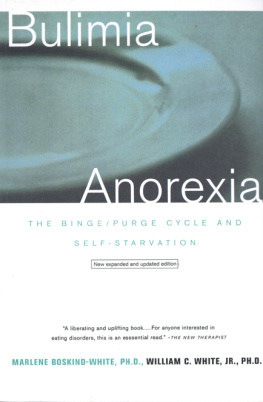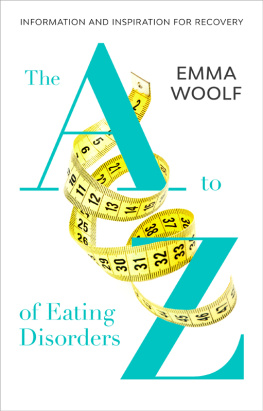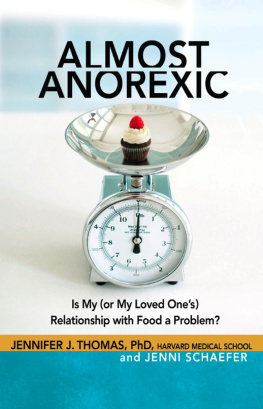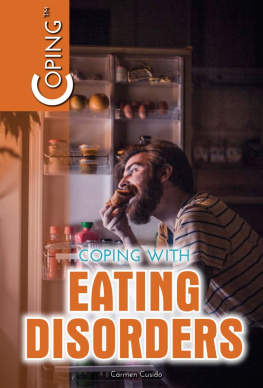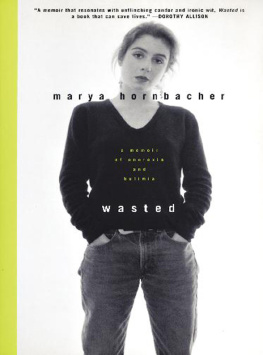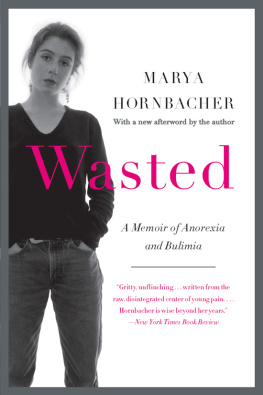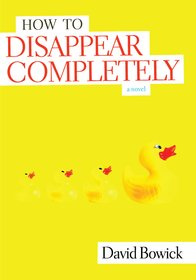Possible attitudes found in books 1) I dont know whats happening to me 2) what does it mean? 3) seized with the deepest sadness, I know not why 4) I am lost, my head whirls, I know not where I am 5) I lose myself 6) I ask you, what have I come to? 7) I no longer know where I am, what is this country? 8) Had I fallen from the skies, I could not be more giddy 9) a mixture of pleasure and confusion, that is my state 10) where am I, and when will this end? 11) what shall I do? I do not know where I am
When its in a book, I dont think itll hurt anymore exist anymore. One of the things writing does is wipe things out. Replace them.
W HEN THEY WHEELED THIRTY-TWO-YEAR-OLD A NNALISES stretcher onto the unit, the patients stood along the hallway walls and tried not to gape.
Now thats a lesson in moderation, someone said.
I wasnt there when she was admitted. I was still enrolled in college, spending most of my time hiding from my watchful roommates and trying to rid myself of my last vice, sugared bubblegum. When I arrived a month after her admission, a younger patient told me about Annalises first day, about how all the units inhabitants had quieted in horror at her presence. She stayed in her bed by order of the doctor the entire month I was a patient there. Occasionally, she would get a phone call and a nurse would wheel her out of her bedroom and down the corridor. She would lift the phone off the receiver and dial with the ends of her long yellow fingernails, the nails of a Chinese aristocrat of old, ones belonging to idle hands. She spoke only to her mother, and her voice was a weak croak. When I walked by her room, I would peek in and smile hello, fascinated by the disgusting creature who so rarely exited her bed. Eventually, we got to talking and she told me about how she was admitted to the hospital this time.
I told my mother, Okay, you can call 911. Her eyes rolled and she smirked, revealing holes where teeth ought to have been. She lifted up her arm to show me her biceps, where doctors had inserted nineteen bags of IV fluid. Her skin was covered in stretch marks, jaundiced and flaky. The room stank of dead cells. Her hair was so severely dreadlocked that the staff had been forced to chop it off. She emerged from the bathroom a cadaver with a pageboy coif. I think about all the images of Annalise that together complete her pitiful, humiliating montage: the staff wheeling her into the bathroom, me watching and knowing that inside they would hold her over a pot while she tried in vain to shit, her whimpering about the amount of apple juice she was forced to drink.
The juice is always really hard for me.
Her first steps down the hallway on rangy, atrophied legs, her terror at the prospect of being tube-fed. When the lawyers for patient rights came to visit, she requested a meeting. Two lawyers sat by the pay phones with Annalise as she looked at the papers. The lawyers turned the sheets for her one by one, and I imagined the spectacle of her in court, arguing to a judge that she knew better than the hospital did, that she could do it on her own, really. How could the judge not laugh in her face?
She told me she liked children, and I thought that kids would probably cross the street when they saw her. They would point and stare and make brazen comments to the adult that held their hands.
Mommy, whats wrong with that lady?
She was the worst, and perhaps most successful, anorexic I had ever seen.
One in ten anorexics will die from the disease, a therapist had said when I was first hospitalized, three years before I met Annalise. Look around the room. At least one of you will not make it.
I googled Annalise periodically after I left New York Presbyterian Westchester Hospital that time, as I did with many of the people I met in treatment. After nearly eight years of googling with no results, one day I stumbled upon her death notice on a funeral home website. Someone wrote that she had passed away after a long and courageous battle. There was a picture of her in the Slide Show of Memories, and though she was only forty in it, she looked closer to seventy. Her cheeks were full and chipmunkish, but her jugular was oddly pronounced and her closed-mouth smile awkward and sunken, betraying her lack of teeth. It was the only picture in the slide show, and it remained on the screen as a Muzak version of Amazing Grace played on repeat.
I N THE SUMMER OF 1998, WHEN I WAS FOURTEEN YEARS OLD , I spent my days at a bookstore near my house. I was bored and eager to escape our stuffy, un-air-conditioned house in the few weeks between camp and family vacation, so I would ride my shiny teal bicycle down to the small shopping area, park out front, and spend an hour or so browsing the bookshelves. I had always been a bookworm, or at least thats what people said about me. She loves to read.
I was small for my age, a girl with a china-doll face and blond hair cut into a straight bob, and I probably looked quite darling with my head buried in a big, fat bound text. Sometimes I developed grand, inexplicable literary ambitions, such as when I decided I would read Les Misrables at age eight, or Anne of Green Gables for my first fourth-grade book report. When my teacher gently suggested I pick something else due to time constraints, I broke down in tears right there in the library of my elementary school. I read everything I could get my hands on, from Roald Dahl to the diary of Anne Frank to science-fiction stories. When I visited the school library, I would wander up and down the aisles and brush my fingertips over the cracked spines of the books, marveling at the number of stories there were in the world, eager for the time when I would be smart and old enough to write my own.
These summer expeditions were different, though. More focused, as I had a specific subject of study to attack. I would stand on trembling legs, slick with cold sweat, and scan the psychology section. It wasnt a particularly well-stocked establishment, but there were still many books about young people, mostly girls, who felt crazy, or were crazy. I didnt think I was crazy, but I kind of wished I were. Crazy people were privy to a universal truth, I thought, destined for artistic greatness, their words indelibly scalded into the collective conscious. And even if they werent mad geniuses, only drooling, voiceless fools, at least they could opt out of regular life. At that time, the idea of taking up residence in a state mental hospital didnt seem entirely unappealing to me, though I had no personal reference for what that kind of place was like and therefore no basis for making such a judgment. Becoming a professional patient, a hopeless case, seemed akin to selling ones possessions and dropping out to live on a commune or defecting to Canyon Ranch for a long-term detox. And besides, most of the hopeless cases I read about actually ended up confounding the doctors prognoses, recovering and then writing books, so what were a few years lost to psychosis if you ended up a famous author at the other end? If I were actually crazy, I would be allowed to exit, at least for a while, the


